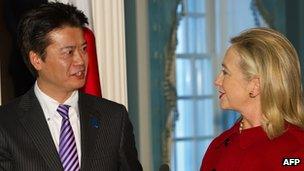Kim Jong-il death: US urges 'path of peace'
- Published
- comments

US Secretary of State Hillary Clinton and her Japanese counterpart Koichiro Gemba held talks
The US has called on North Korea to pursue a "path of peace" following the death of leader Kim Jong-il.
Secretary of State Hillary Clinton said the US was ready to help the North Korean people and create lasting security on the Korean peninsula.
Kim Jong-il died on Saturday of a heart attack, state media said. State TV is showing images of people filing past his open coffin in Pyongyang.
The US has been holding urgent talks with the communist state's neighbours.
President Barack Obama has promised to defend regional allies.
A period of official mourning for Kim Jong-il is now under way in North Korea. He is to be buried on 28 December.
Footage from Pyongyang showed North Koreans crying and grieving for the long-time leader.
Kim Jong-il, whose age was given as 69 when he died, had been in the process of formalising his third son, Kim Jong-un, as his successor.
But the transition had not been completed and analysts fear Mr Kim's death could trigger a period of instability in the internationally isolated nuclear-armed state.
State media said Kim Jong-un visited the body of his father on Tuesday to pay his respects.
Inside North Korea, citizens appear to be mourning Mr Kim - their leader since the death of his father Kim Il-sung in 1994.
But around the region countries have been holding urgent talks about what the implications of Mr Kim's death might be.
"It is our hope that the new leadership of the DPRK (North Korea) will choose to guide their nation onto the path of peace by honouring North Korea's commitments, improving relations with its neighbours, and respecting the rights of its people," Mrs Clinton said in a statement.
"The United States stands ready to help the North Korean people and urges the new leadership to work with the international community to usher in a new era of peace, prosperity and lasting security on the Korean peninsula."
US President Barack Obama has spoken to both the South Korean and Japanese leaders to discuss the situation.
In his conversation with Japanese Prime Minister Yoshihiko Noda, he "underscored the United States' commitment to the defence of our close allies, including Japan", the White House said in a statement.
Mrs Clinton also held talks with Japanese Foreign Minister Koichiro Gemba, in Washington for a pre-arranged visit.
Defence Secretary Leon Panetta, meanwhile, spoke to his South Korean counterpart early on Tuesday. The two agreed to co-ordinate closely and maintain a "strong defence posture", Yonhap news agency reported.
South Korea's military has been put on alert in the wake of the announcement on Monday on North Korean state television.
The government has also increased its alert level against possible cyber attacks from Pyongyang.
But it says it will reconsider a plan to display Christmas lights near the border - something that angers North Korea.
'Great Successor'
Chinese President Hu Jintao, meanwhile, has visited the North Korean embassy in Beijing to offer his condolences, China's Xinhua news agency said.
Late on Monday, the Chinese foreign minister also met the North Korean envoy in Beijing, the agency reported.
China is North Korea's closest ally and its biggest trading partner.
It is keen to avoid a power struggle that could bring further instability to the region or any kind of collapse that would send a tide of North Korean refugees across its border.
In a statement on Monday, Beijing called on North Koreans to unite under the leadership of Kim Jong-un.
Kim Jong-un, hailed by North Korean media as the "Great Successor", is believed to have visited China on at least one occasion in recent months.
Not much is known about the younger Kim, who is thought to be in his late twenties. He was first introduced in public as Kim Jong-il's earmarked successor in September 2010.
Cuba has declared three days of mourning for the North Korean leader.